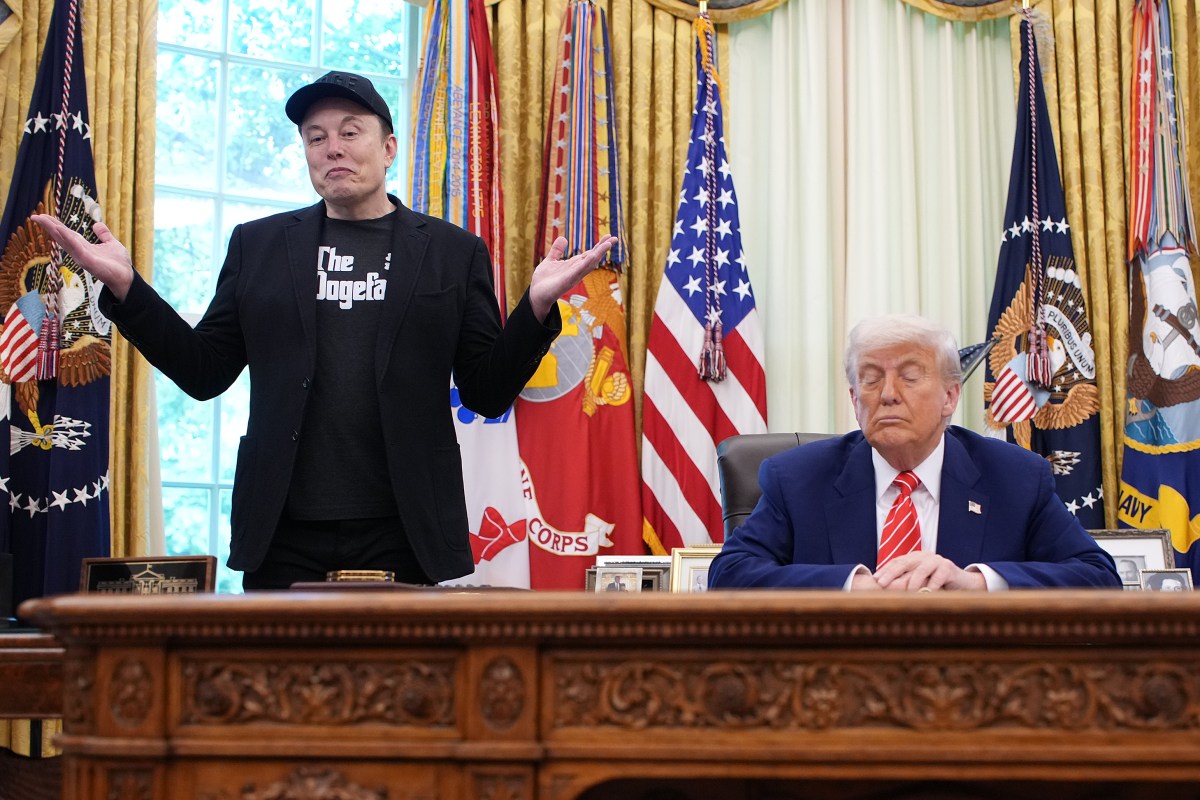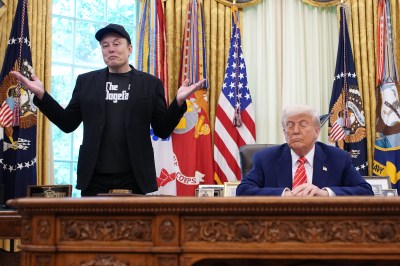Happy Tuesday! On Sunday, Gukesh Dommaraju, a 19-year-old chess grandmaster, upset fellow chess grandmaster Magnus Carlsen, the International Chess Federation’s No. 1 ranked chess player since 2011. The five-time World Chess Champion pounded his fist on the table as he lost, but still collected himself to give Dommaraju a congratulatory pat on the back.
Quick Hits: Today’s Top Stories
- Axios reported Monday that the U.S. presented Iran a nuclear deal proposal Saturday that allows the Islamic Republic to enrich a certain amount of low-level uranium in the country while also requiring the country to “dismantle critical infrastructure for conversion and processing of uranium,” not build any further uranium enrichment facilities, and halt research and development for centrifuges used to enrich uranium. However, an unnamed Iranian diplomat told Reuters on Monday that Iran plans to reject the proposal as a “non-starter,” stating, “The U.S. stance on enrichment on Iranian soil remains unchanged, and there is no clear explanation regarding the lifting of sanctions.” U.S. special envoy to the Middle East Steve Witkoff—who issued the proposal to Tehran on Saturday—and Secretary of State Marco Rubio have both previously publicly stated that the U.S. would oppose any deal that allows Iran to continue uranium enrichment.
- China’s Commerce Ministry on Monday accused the U.S. of violating a May 12 trade agreement in which both countries agreed to lower tariff rates on each other’s imports. A ministry spokesperson cited a ban preventing chip design software from being sold to China, the U.S.’s newly issued AI chip export control guidelines, and a plan to rescind visas for Chinese students, which Rubio announced last week. President Donald Trump had accused China of violating the same deal on Friday, without citing specific transgressions, and, later that day, announced he would double the tariff on U.S. imports of steel and aluminum from 25 to 50 percent.
- The BBC reported Monday that Austin Tice—a U.S. Marine turned American journalist who went missing in 2012 while reporting in Syria—had been imprisoned by the regime of now-deposed Syrian dictator Bashar al-Assad, per former Syrian officials and classified Syrian intelligence documents the outlet reviewed. The BBC was investigating Tice’s disappearance for a podcast series and came across a classified file labeled “Austin Tice,” which confirmed he was detained in Damascus in 2012 and where, per a Syrian official who confirmed Tice’s detainment, he was held until at least February 2013. Last month, Qatari-funded news outlet Al Jazeera reported that a search team had found Tice’s body in Syria’s Aleppo region, but a spokesperson for Tice’s family said that report was “erroneous,” and U.S. government officials said as recently as December 2024 that they believe Tice to be alive.
- The 45-year-old man suspected of attacking peaceful pro-Israeli protesters in Boulder, Colorado, this weekend with a “makeshift flamethrower” was charged with a federal hate crime “involving actual or perceived race, religion, or national origin,” along with state charges, including 16 counts of attempted first-degree murder. Local police said Monday that none of the 12 victims injured in the attack has died, though two currently remain in critical condition. Federal court records show that the suspect told investigators that “he wanted to kill all Zionist people,” planned the attack one-year in advance, and “specifically targeted” the pro-Israeli group supporting the immediate release of hostages held in Gaza. Meanwhile, Homeland Security Department Assistant Secretary Tricia McLaughlin tweeted Monday morning that the suspect, who was born in Egypt, entered the U.S. in August 2022 and illegally overstayed his B-2 visa.
- Russian and Ukrainian negotiators met for a second round of talks in Istanbul, Turkey, on Monday, agreeing to exchange severely wounded prisoners of war, detainees younger than 25 years old, and the bodies of 6,000 deceased soldiers each. Peace talks, however, failed to progress: Ukrainian officials said Russia refused to accept an “unconditional ceasefire,” while Russian-state media reported that Russian diplomats told Ukraine a peace deal could not be achieved unless Ukraine agreed to cede large amounts of territory and limit its military capabilities. Ukraine also shared with Russia a list containing the names of Ukrainian children abducted by Russian forces, which Russian delegation head Vladimir Medinsky refuted as propaganda, calling the list “a show.”
- Polish voters on Sunday elected Karol Nawrocki, an independent nationalist candidate backed by the country’s populist, right-of-center Law and Justice Party, as Poland’s next president. Nawrocki, who campaigned opposing EU immigration policies and Ukraine’s entrance into NATO, defeated Warsaw Mayor Rafał Trzaskowski—a self-described centrist supported by the anti-populist Civic Platform Party—within a 2-point margin: 50.89 percent to 49.11 percent. As president, Naworcki will have the power to veto legislation from the Civic Platform’s parliamentary majority, tempering the agenda of Polish Prime Minister Donald Tusk, who co-founded Civic Platform. Naworcki will be sworn into office on August 6, replacing incumbent, term-limited, President Andrzej Duda, also supported by Law and Justice.
- The Supreme Court declined Monday to hear two separate cases challenging the constitutionality of gun-control laws passed by Maryland and Rhode Island. One case challenged a Maryland law enacted in 2013 banning certain semiautomatic rifles, including the AR-15 and AK-47. The other challenged a Rhode Island law passed in 2022 banning large-capacity ammunition magazines, which the statute defined as devices capable of holding 10 rounds of ammunition that are fed “into a semi-automatic firearm.” Neither case earned the support of at least four justices necessary to add a case to the court’s docket.
Musk’s DOGE Legacy: Nominal Savings, Lots of Uncertainty

Elon Musk came to Washington, D.C., promising to slash $2 trillion in government waste, fraud, and abuse. On Friday, Musk exited sporting a black eye he claimed was from his 5-year-old son and fending off questions about a New York Times story detailing his alleged drug abuse. When asked about the reporting, Musk deflected in a sarcastic reference to the Times’ reporting on Russian election interference. “That New York Times?” Musk asked. “Let’s move on.”
Musk is likely ready to move on from more than just questions about his alleged drug habit. Aside from family issues and a 71 percent drop in Tesla’s net income, Musk—as his temporary status as a “special government employee” expires—is walking away from the Department of Government Efficiency (DOGE) without reaching even a fraction of his initial cost-cutting goals. DOGE’s failure is more than a tale of Musk’s overambition, however: Its sledgehammer approach to federal bureaucracy has left agencies in chaos, setting the stage for possible consequences long after he has gone.
President Donald Trump announced DOGE in the weeks after the election, initially naming Musk and Vivek Ramaswamy as “outside volunteers” committed to reducing government regulation and cutting $2 trillion in spending. By Inauguration Day, Ramaswamy was out, leaving DOGE as Musk’s project.
The first step of the DOGE process was using the U.S. Digital Service, while former President Joe Biden was still in office, to gain access to government systems. It then placed members, including interns at Musk’s various companies, in the Office of Personnel Management (OPM), giving them access to government human resources information. DOGE personnel eventually embedded themselves across agencies in the executive branch.
From there, DOGE spun the federal government into chaos as it cut contracts, eliminated agencies, and fired workers. In a move with resounding effects on most federal agencies, OPM ordered the firing of thousands of probationary workers, citing poor performance as the reason behind the terminations, despite including employees with strong performance reviews and recent promotions. For federal workers not terminated, the Trump administration offered deferred resignation buyouts, which more than 75,000 employees accepted. It also fired thousands of U.S. Agency for International Development (USAID) employees, eventually moving to shut down the agency entirely. DOGE targeted Health and Human Services as well, laying off more than 10,000 employees and encouraging another 10,000 to take buyouts or early retirement. All told, Reuters reports, more than 260,000 firings and buyouts have been confirmed so far. While the Trump administration may see these cuts as a win, the loss of workers has hobbled services in agencies from the Forest Service to the Internal Revenue Service to the Energy Department.
At one point, the Trump administration removed nuclear safety employees who were critical to national security. It then attempted to rehire them, but did not have their contact information. “It was really a slash and burn cost cutting without a plan,” Elaine Kamarck, senior fellow in Governance Studies at the Brookings Institution, told TMD. “Their basic problem was they didn’t have a plan, which means that the cost cutting will not last.” Some of the firings have already been reversed.
Dozens of lawsuits have halted and reversed certain firings, leaving federal workers in limbo. A federal judge ordered the government to reinstate certain probationary workers, but the Supreme Court later put that order on hold. The chaos has created situations where certain employees were fired, rehired, fired, and rehired again.
“There is a lot of wasteful spending in government, but in order to cut that spending, you need institutional buy-in,” Dominik Lett, a budget and entitlement policy analyst at the Cato Institute, told TMD. “You need to do it by the book. You need to get Congress involved. Otherwise, you’re going to get held up in the courts.”
Layoffs at several agencies are currently paused, but the Trump administration has asked the Supreme Court to let it resume the cuts. Meanwhile, another lawsuit from 14 Democratic attorneys general from 14 states is proceeding.
Some legal challenges relate not to firings but to DOGE’s access to extensive private records. It was granted access to sensitive Treasury data about U.S. citizens, and it worked to pool government data about Americans into one centralized database. DOGE also set out to modernize federal technology software, which has been moderately successful in some specific applications, according to former DOGE staffers. However, DOGE’s use of Musk’s Grok AI software creates potential conflicts of interest and has spawned privacy concerns.
Yet all the slashing and burning has only yielded nominal savings. On its website, DOGE prominently displays a “wall of receipts” showing canceled contracts, grants, and leases that total more than $70 billion, with workforce deductions bringing the total claimed savings to $175 billion. It’s a far cry from the initial $2 trillion goal, which was reduced to $1 trillion and then again to $150 billion. But the savings are likely significantly less than DOGE asserts.
“It’s impossible to say with specificity how much DOGE has saved because it’s just too early to tell and the government databases have not fully caught up,” Jessica Riedl, senior fellow at the Manhattan Institute, told TMD. “However, based on the DOGE wall of receipts as well as my reading of the monthly Treasury spending statements, it’s looking like they have saved perhaps $20-30 billion annualized, with perhaps $10 billion more coming in October when the new fiscal year begins and those employee buyouts take effect.” That number is significantly less than 1 percent of federal spending, which has risen overall since Trump took office. Riedl notes that lost revenues because of IRS enforcement layoffs may wipe out the savings entirely.
DOGE’s own savings calculations have come under quite a bit of criticism. Some contracts were double and triple counted, while others were initially tallied incorrectly. After the discrepancies were exposed, the website removed information that could be used to fact check its savings estimates.
“I think that Elon was under the impression that there was significantly more fraud in the government than was occurring,” Lett said, “and that he wouldn’t have to actually make any changes to major entitlement programs in order to achieve significant deficit reduction.”
Some in the administration are trying to frame DOGE as a success. Vice President J.D. Vance has tried to recontextualize DOGE, saying that its real goal was to make the government more “responsive to the people.” But Riedl thinks DOGE’s goal was never about spending.
“By DOGE’s stated goals, it has failed. However, I would argue that DOGE’s goal was never really to fix the deficit,” Riedl said. “Ultimately, the White House was able to fire and intimidate federal employees, Congress was able to create cover for major tax cuts, MAGA voters got government spending cut theater and revenge against perceived enemies, and Elon Musk got access to federal proprietary data and opportunities to guarantee federal contracts.”
The extent to which Musk was directly involved in the DOGE project is still unclear. In legal documents filed earlier this year—in response to a legal effort against Musk and DOGE—the Trump administration asserted that Musk had no formal authority to make decisions in the government and he was not in charge of DOGE. Yet Trump repeatedly said in public that Musk was in charge of the effort.
Musk was certainly involved enough to make enemies in the White House. In a Cabinet meeting in March, he excoriated Secretary of State Marco Rubio for not cutting enough personnel. Rubio was already upset by DOGE’s takedown of USAID, a department under his control. At the same meeting, Musk snapped at Transportation Secretary Sean Duffy when he pushed back against DOGE efforts to have him lay off air traffic controllers.
It took little time for Trump’s trust in Musk to wobble. According to the Wall Street Journal, the president’s shift came when he heard Musk was scheduled to attend a top-secret Pentagon meeting about China in April. Trump later expressed displeasure with the paltry savings Musk had to show after over 100 days in Washington, asking whether Musk’s claims were “all bulls—t.” To Trump, Musk was “50% genius, 50% boy,” according to comments heard by staffers.
Another issue was the communication gap between administration officials and Musk. Trump advisers and aides often discovered DOGE cuts through news reports and Cabinet secretaries, and Trump himself learned exactly when Musk was leaving Washington only when he announced it on X. And while Musk was at the White House nearly every day at the beginning of the term, he began to show up only occasionally as time went on.
Musk, for his part, has seemed disillusioned in interviews leading up to his exit but continued defending his efforts. “DOGE became the whipping boy for everything,” Musk said in an interview last week with CBS Sunday Morning. He has been bolder about criticizing the Trump administration, too. “I agree with much of what the administration does,” Musk said. “But I also don’t wanna take responsibility for everything this administration is doing.” He lamented the GOP reconciliation bill, saying that it undermined the work DOGE was doing.
Musk may be out, but the shockwaves from DOGE will continue to reverberate throughout the government. “Right now, Elon Musk has planted 20 or so bombs in the U.S. government. There are things that will go wrong, whether it’s the fact that they tried to dismember FEMA, and we might have a hurricane any day now, whether it’s the fact that we might have an avian bird flu moving into the population and they are way behind on the research,” Kamarck said. “Something is going to blow up in their faces as a result of this mammoth interruption.”
The cuts to USAID might portend an even darker legacy for DOGE. Experts anticipate possibly hundreds of thousands of deaths around the world from HIV, tuberculosis, malaria, and other illnesses. Rubio has denied that any children have died so far, but reporting on the issue already says otherwise.
And DOGE itself isn’t dead, yet. A longtime member of the Interior Department was recently escorted out of the building for telling staff to ignore DOGE directives. Trump is planning to send a “rescissions” bill to codify roughly $9 billion in DOGE spending reductions, and Budget Director Russell Vought has discussed using impoundments to formalize cuts, as well. White House deputy chief of staff Stephen Miller said on X that DOGE’s work “has only just begun."
Musk might not be out, either. Trump left the door open for the SpaceX founder to be “back and forth.” But it seems like Musk is ready for his days in government to be over. “The federal bureaucracy situation is much worse than I realized,” he said. “I thought there were problems, but it sure is an uphill battle trying to improve things in D.C., to say the least.”
Today’s Must-Read
You can credit President Donald Trump with a certain consistency. The first trip he took abroad during his first term was to Saudi Arabia. His first trip abroad in the current term was also to Saudi Arabia. And he expressed the same sentiments each time. “We are not here to lecture,” Trump said upon landing in Riyadh in May 2017. “We are not here to tell other people how to live, what to do, who to be, or how to worship.” What a relief that had to be to dictators. In their minds, it’s their job to tell other people how to live, what to do, etc. In May 2025, Trump reassured his listeners that the United States would not be giving them “lectures on how to live” or how to govern their “own affairs.” No, the peoples of the Middle East would be charting their “own destinies.”
Toeing the Company Line
It’s Time for the President to Address Our Antisemitism Problem
All Americans, including Jews, need to hear from the country’s leaders.
Harm Reduction to Heal America
Americans are sicker and shorter-lived than people in other rich countries. Here’s how to fix that.
Why Taiwan Is the West Berlin of Our Time
Small democratic enclaves cast outsize shadows on authoritarian powers.
Republicans Try to Sell a Reaganite Rationale for Trump’s Tariffs
The talk at an economics forum showed a wary acceptance of Trump’s economic policy.
Union Blues
Why Republican support for gay marriage is dropping.
Why America Needs to Win the AI War
‘Once you’ve won, there’s no second place.’
The Sanctimonious Swamp
Gross corruption happens. But the reality of Washington is more banal.
Worth Your Time
- Writing in the New York Times, Masha Gessen profiles Christo Grozev, the journalist who tracks down undercover Russian spies. “He identified the secret police agents behind one of the most high-profile assassination plots of all: the 2020 poisoning of the Russian opposition leader Aleksei Navalny,” Gessen wrote. “That revelation put Grozev in President Vladimir Putin’s cross hairs. He wanted Grozev killed, and to make it happen the Kremlin turned to none other than the fugitive financier, who, it turns out, had been recruited by Russian intelligence. Now the man that Grozev had been tracking began tracking him. The fugitive enlisted a team to begin the surveillance. The members of that team are behind bars now. The financier lives in Moscow, where several times a week he makes visits to the headquarters of the Russian secret police. Grozev—still very much alive—imagines the man trying to explain to his supervisors why he failed in his mission. This gives Grozev a small measure of satisfaction.” But being on Putin’s hit-list still comes at a cost. Gessen wrote, “His daughter is about to graduate from high school and his son is finishing medical school. For a long time, both had assumed they could join their father in the United States, but this no longer appeared obvious. Nothing did. ‘Is your wife still your wife?’ I asked. ‘I believe so,’ Grozev said. ‘We don’t see each other, but we are very friendly.’”
- In The New Yorker, Louisa Thomas explores big-league softball, which just recruited former Major League Baseball general manager Kim Ng as commissioner ahead of its inaugural season. “The first time she [Ng] walked into Devon Park, in Oklahoma City, where the Women’s College World Series is held, she was overwhelmed by how big an event it was. ‘I was, like, ‘Oh, my God, I’ve got to bring my mother. I’ve got to bring my sisters,’ she said. … In April, [Athletes Unlimited] announced that Ng would be the commissioner of the Athletes Unlimited Softball League, which begins its first season this Saturday with four inaugural teams,” Thomas wrote. “And, on Thursday, M.L.B. announced a long-term investment in the league—a stake reported to be in the eight figures—along with broadcast and sponsorship support. There’s ‘usually a challenge getting everyone on the same page,’ Noah Garden, an M.L.B. deputy commissioner, told me. ‘That hasn’t been the case here. The visions are so aligned. I’ve almost never seen that.’”
Presented Without Comment
Reuters: To Attack Russian Air Bases, Ukrainian Spies Hid Drones in Wooden Sheds
The sheds were loaded onto trucks that were driven to the perimeter of the air bases. The roof panels of the sheds were lifted off by a remotely-activated mechanism, allowing the drones to fly out and begin their attack, the official said.
Also Presented Without Comment
Washington Post: Trump Could Pardon [Sean Combs] Diddy, But 50 Cent Hopes To Dissuade Him
In the Zeitgeist
After a decade-long absence, the animated children’s TV show Phineas & Ferb is set to return this week with brand-new episodes: Season 5 will premiere Thursday on Disney+.
The show may be a cartoon, but that doesn’t mean the characters won’t show signs of aging. As Dave Povenmire, the show’s co-creator, shared, Phineas will have one additional stripe on his shirt. “He hasn’t actually gotten any taller,” he said, “but we’re giving him the illusion of getting taller.”
Let Us Know
Do you think Elon Musk accomplished anything positive in his time in government service? What would a less chaotic attempt to reduce government waste look like?















Please note that we at The Dispatch hold ourselves, our work, and our commenters to a higher standard than other places on the internet. We welcome comments that foster genuine debate or discussion—including comments critical of us or our work—but responses that include ad hominem attacks on fellow Dispatch members or are intended to stoke fear and anger may be moderated.
With your membership, you only have the ability to comment on The Morning Dispatch articles. Consider upgrading to join the conversation everywhere.